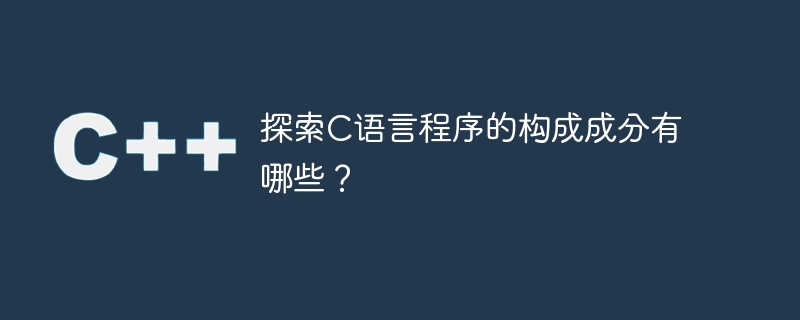

C language is a high-level programming language that is widely used in software development and system programming. It is designed as a general-purpose, procedure-oriented language known for its simplicity of learning, fast execution speed, and high portability. C language has rich components, and these components cooperate with each other to form a complete program.
In C language programs, the most basic units are characters and identifiers. Characters are the smallest unit that constitutes program text. They can be letters, numbers, symbols, etc. Identifiers are names composed of letters, numbers, and underscores, and are used to name variables, functions, etc.
Variables are a way to store data in a program. In C language, each variable has a data type, such as integer, floating point, character, etc. Variables need to be declared and initialized before use, and their values can be accessed and modified through the variable name.
There are also some constants in the C language. Constants are fixed values in the program. Common constants include integer constants, floating point constants, character constants and string constants.
Another important component is the operator. C language supports a variety of operators, including arithmetic operators, relational operators, logical operators, etc. Operators can be used to perform numerical calculations, comparisons, and logical judgments.
Statement is the basic execution unit of C language program. Statements in C language are divided into expression statements, control statements and function call statements. Expression statements are used to perform numerical calculations and assignment operations, and control statements are used to control the flow of the program, such as conditional statements, loop statements, etc. The function call statement is used to execute a function and return the result to the caller.
Function is an important part of C language program. A C language program usually consists of multiple functions. A function consists of a function name, parameter list, return type, function body and return statement. They are used to divide the program into multiple modules to improve readability and reusability.
Array is a special variable type that can store multiple data of the same type. Arrays are used in C language to store a series of related data, the elements of which can be accessed and modified based on indexes.
Pointer is another important concept in C language, which can store the address of a variable. Through pointers, you can directly access and modify the value of a variable, and you can also pass parameters and return values between functions.
Structure is a user-defined data type that can contain multiple member variables of different types. Structures are often used in C language to represent a set of related data, such as a person's name, age, gender and other information.
The above-mentioned components are only part of the C language, and there are other important concepts and features, such as enumeration, union, file operation, etc. By mastering these components, we can write powerful and efficient C language programs according to our needs.
The above is the detailed content of Explore what are the components of a C language program?. For more information, please follow other related articles on the PHP Chinese website!




